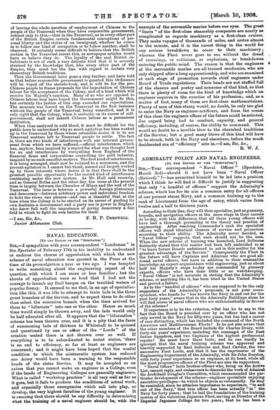NAVAL EDUCATION.
iTo TEE EDITOR OF THE " SPECTATOR." j sympathise with your correspondent "Landsman" in the Spectator of February 17th in his inability to understand or endorse the chorus of approbation with which the new scheme of naval education was greeted in the Press at the time of its promulgation a year or two ago. I was tempted to write something about the engineering aspect of the question, with which I am more or less familiar ; but the shouts of approbation were so loud that I had not the courage to launch my frail barque on the troubled waters of popular frenzy. It seemed to me that, in an age of specialisa- tion like this, it was idle to attempt to train lads in the three great branches of the Service, and to expect them to do other than select the executive branch when the time arrived for them to " bifurcate " into one or the other. Hence so much time would simply be thrown away, and the lads would only be half educated after all. It appears that the " bifurcation " scheme has been thrown over, and it is a pity that the farce of summoning lads of thirteen to Whitehall to be quizzed and questioned by one or oilier of the " Lords " of the creation • seated there is not thrown over as well. If everything is to be subordinated to social status, •there is an end to efficiency, so far at least as engineers are concerned ; and it might have been hoped that the woeful condition to which the aristocratic system has reduced our Army would have been a warning to the responsible heads of the sister Service. It may be accepted as an axiom that you cannot make an engineer in a College, even if the heads of Engineering Colleges are generally engineers. What is called "workshop practice" is all very well as far as it goes, but it fails to produce the conditions of actual work, and especially those emergencies which call into play, or develop, the very highest faculties of the young engineer. It is amazing that there should be any difficulty in determining *hat the training of a naval engineer should be, with the example of the mercantile marine before our eyes. The great "liners "of the first-class steamship companies are nearly as complicated as regards machinery as a first-class cruiser. They make voyages of thousands of miles, and arrive almost to the minute, and it is the rarest thing in the world for any serious breakdown to occur to their machinery ; whereas the Fleet never goes to sea without the dread of ram mings, or collisions, or explosions, or breakdowns entering the public mind. The reason is that the engineers • of the mercantile marine are all trained mechanics, who are only shipped after a long apprenticeship, and who are examined at each stage of promotion towards chief engineers under Board of Trade regulations. Their heads are not stuffed full of the classics and poetry and nonsense of that kind, so that there is plenty of room for the kind of knowledge which an engineer requires in the exercise of his profession ; and, as a matter of fact, many of them are first-class mathematicians. Plenty of men of this stamp would, no doubt, be only too glad to enter the Navy as engineer-artificers, and from the cream of this class the engineer officer of the future could be selected, due regard being had to conduct, capacity, and general efficiency, including, of course, the ability to command. This would no doubt be a terrible blow to the cherished traditions of the Service ; but a good many blows of this kind will have to be struck:, both in the Navy and elsewhere, before the much desiderated era of " efficiency " sets in.—I am, Sir, &c.,
R. W. J.










































 Previous page
Previous page